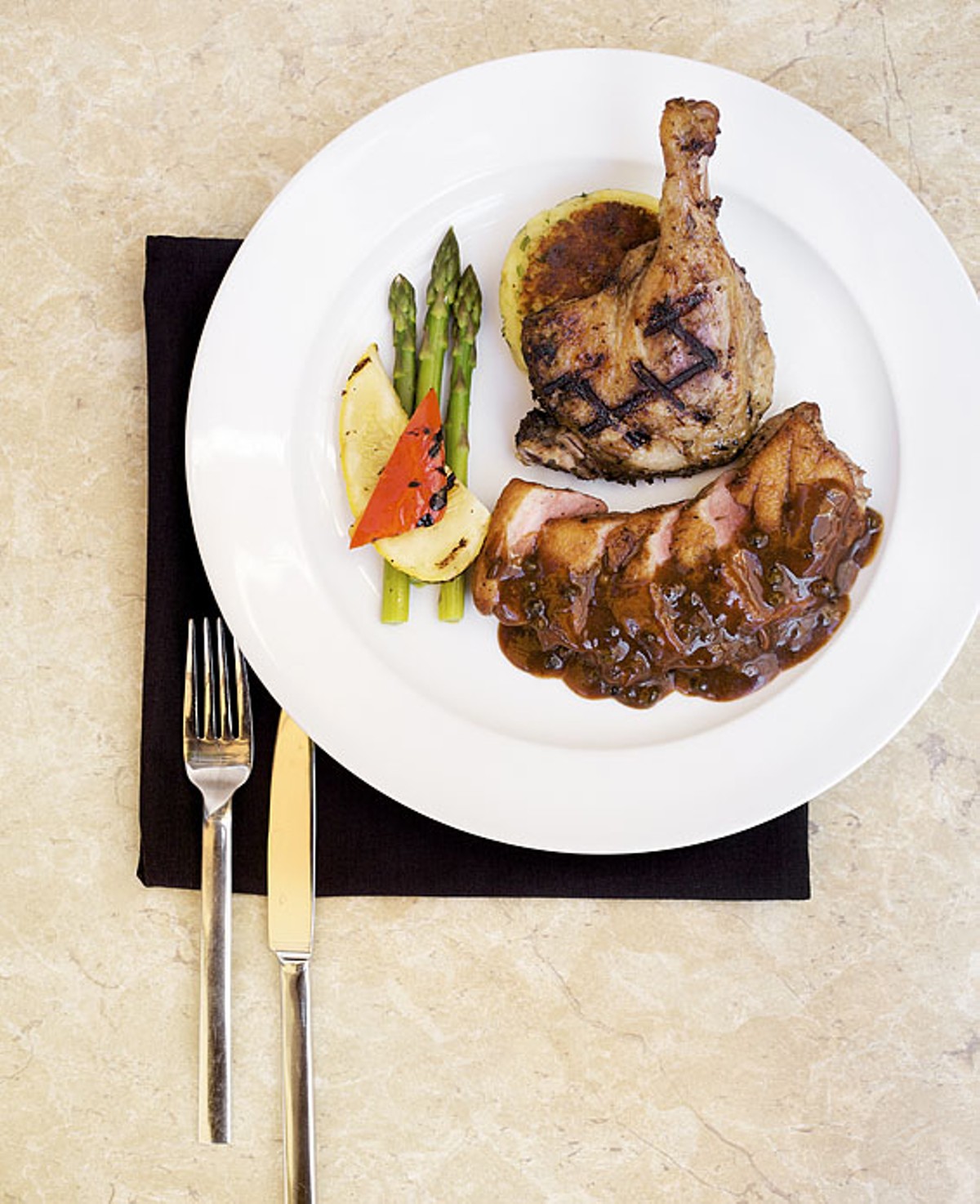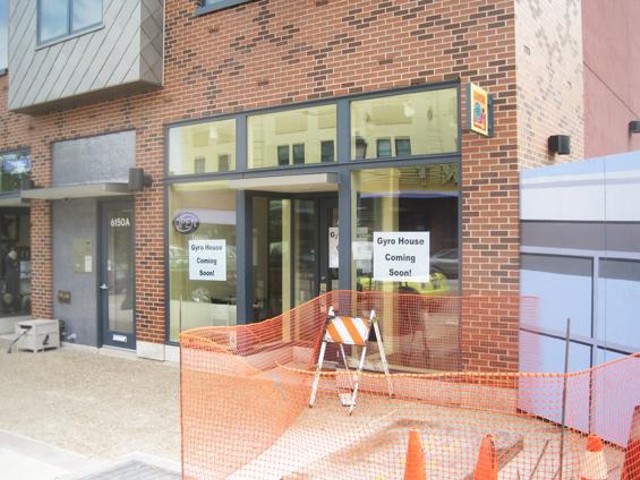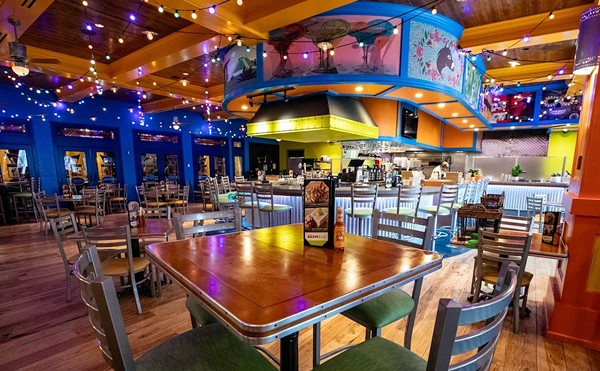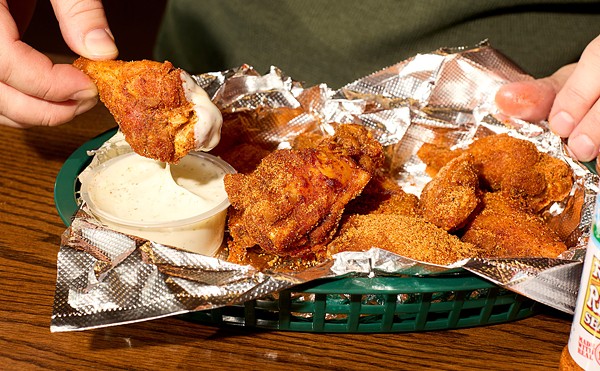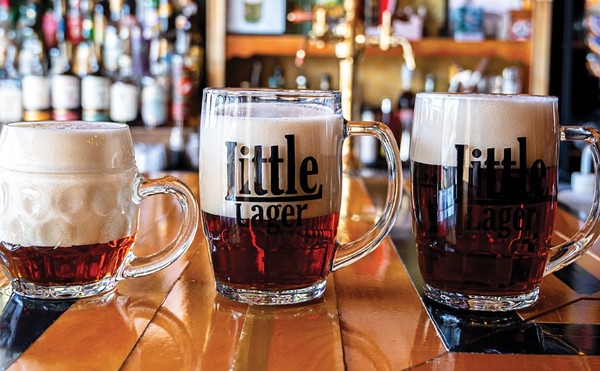December 29, 2007. Doesn't seem too long ago. Consider, though: The New England Patriots defeated the New York Giants to clinch the first undefeated sixteen-game season in NFL history, the team's fourth Super Bowl title of the decade a mortal lock. Senator Hillary Clinton was preparing for a Democratic primary season considered more coronation than competition. She merely had to dispense with that pesky young U.S. senator from Illinois with the funny name. In St. Louis, in the wee hours of the morning, a disgruntled former employee set a fire at Copia Urban Winery, devastating the stylish and popular Washington Avenue restaurant.
In the restaurant business especially, two and a half years is an eternity. When those 30 months happen to span a terrible economic downturn and a sluggish recovery, even the word eternity might not be strong enough. Through it all, however, owner Eyad Tammas insisted Copia would reopen. Plywood covered the windows. Whispers abounded: It would return last summer, last fall, last winter. Finally, in June of this year, it did.
Simply to step inside Copia is to understand what a gap the fire left in the loft district. The restaurant is enormous. You enter into the bar and lounge, which by itself is bigger than many of the restaurants I've reviewed in recent months. A thick glass partition through which water ceaselessly falls separates the bar from the main dining room. This is a large, airy space, its décor drab and hotel lobby-esque, with a view on one end onto Washington Avenue, on the other into the open kitchen.
As large as Copia's dining room is, it has nothing on the patio. Dubbed the "wine garden," the space does indeed capture the scope, if not the ambiance, of a European beer garden. It can accommodate well over 100 diners. There are fireplaces, flat-screen TV sets and a decorative pool. The combination of four walls and open sky creates its own microclimate, with a strong breeze. Is there a threat of rain? No problem. A switch is flipped, and a roof slides into place!
Amid such spectacle, the food clamors for attention. Salmon cured with lemongrass, an appetizer, is lovely to behold, the thin slices of fish wrapped around one another to resemble a blooming flower. Unfold a petal and you're rewarded with luscious salmon, its sweetness gradually yielding to lemongrass' verdant kick.
An order of smoked spare ribs brings an entrée that might raise eyebrows at Outback: a full rack separated into individual ribs, piled high at the center of the plate and topped with a tangle of fried onion strings. (In addition, there are sides of beans and cole slaw, as well as a dish of barbecue sauce.) The ribs are meaty, reasonably tender and lightly smoky. The seasoning is minimal, but a dollop of the tangy sauce helps accent the pork's flavor.
Dave Rook was the chef before the fire. He returns as chef now. Though the concept is hopelessly outdated, New American best describes his cuisine. The menu covers the same broad range — appetizers include both fried calamari and seared foie gras, entrées both the down-home spare ribs and a filet of beef tenderloin topped with king crab and hollandaise sauce — that rendered the term "New American" so generic as to be meaningless.
Duck breast in a reduction of its natural juices with candied dates and green peppercorns is one of Copia's more enticing dishes. The skin is crisp, the meat a gorgeous dusky purple in the middle. The sauce adds a gentle sweetness and, from the peppercorns, a significant bite, both of which pair well with the richly flavored flesh. Yet this is only one component of the dish. There are also two confit duck legs. These aren't bad, but what they mostly add to the dish is more duck (the skin not as crisp, the meat not as sumptuous). There is a potato cake with Maytag blue cheese. Not a bad notion per se, but here the strong cheese doesn't jibe with the duck's sauce, and on its own the cake seems unfinished, its exterior not browned enough to give it any more flavor besides the cheese. There is a token offering of vegetables: precisely two asparagus stalks, one slice of yellow squash and one piece of red pepper.
This exact-same arrangement of vegetables accompanies an indulgent, comforting lasagna: chicken, mushrooms, spinach and noodles, already gooey with cheese, sitting in a rich cream sauce. And — hey! — here come those vegetables again alongside a filet of beef. Cooked medium-rare, the tenderloin was juicy, with a strong mineral flavor nicely rounded out by a dab of cognac-infused butter. Yet the dish as a whole was perfunctory, what with the vegetable trio and a glop of average mashed potatoes.
Then again, average mashed potatoes were preferable to those that were spiked with wasabi, a cumulonimbus cloud of which accompanied a seared piece of tuna. Tuna requires — and demands — minimal fuss. The flavor is clean and pure. The wisp of wasabi paste that graces a piece of nigiri sushi is a bracing accent. Here the potatoes were so heavily dosed with wasabi that the only comparable flavor — or, rather, sensation — I can think of is accidentally swallowing mouthwash. Of course, you can avoid placing the fish and the potatoes on your fork at the same time, but that leaves you with tuna that's drowned in a cloyingly sweet sauce.
Copia retains an expansive wine list, as well as its admirable policy of charging retail plus a modest corkage fee rather than the usual restaurant markup. While oenophiles have pages to search and a sommelier to consult, the merely curious might be disappointed to note that very, very few wines are available by the glass.
At the end of your meal, your server will bring the dessert tray. The selections are utterly predictable: crème brûlée, a chocolate brownie, gooey butter cake. That last item, paired with a black-raspberry sorbet, is a strange affair, shockingly unsweet, more crust than gooey butter.
Almost as remarkable as Copia's return from the ashes is how smoothly it has picked up where it left off. Consulting the Riverfront Times' review of the restaurant from 2005, I find several of the same dishes mentioned. You step into this super-size restaurant, and you can almost forget that downtown's renaissance has stalled, that the economy collapsed, that the restaurant scene has changed so drastically from the indulgent mid-Aughts to today. Two and a half years after the fire at Copia, it's as if nothing ever happened.

